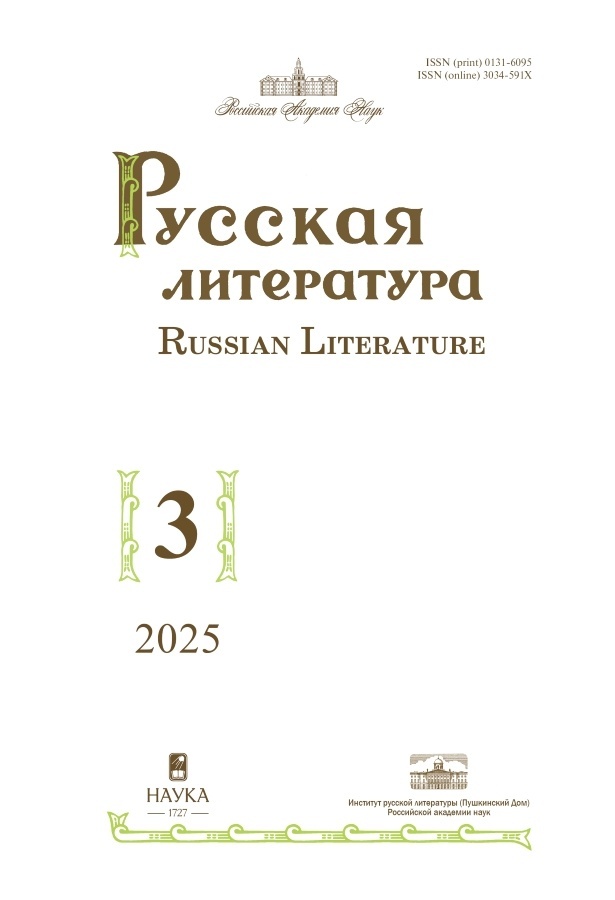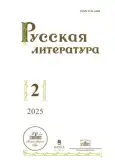The Pragmatics of F. M. Dostoyevsky’s Art
- Authors: Barsht K.A.1
-
Affiliations:
- Institute of Russian Literature (Pushkinsky Dom) of the Russian Academy of Sciences
- Issue: No 2 (2025)
- Pages: 155-169
- Section: Публикации и сообщения
- URL: https://journals.eco-vector.com/0131-6095/article/view/688146
- DOI: https://doi.org/10.31860/0131-6095-2025-2-155-169
- ID: 688146
Cite item
Abstract
The article proposes a theory concerning the utmost importance of organic philosophy in the art and worldview of F. M. Dostoyevsky; taking its initial shape in his early years, the philosophy was reinforced in the years of his exile to Siberia and informed his literary practices of the 1860s–1870s. The idea of the vibrant and sapient Universe with the human being treated as a part of its Whole emerged from the ideas of the Enlightenment, to be supported by the older Slavophiles, A. S. Khomiakov and I. V. Kireyevsky, and later expanded by A. A. Grigoryev, M. M. Dostoyevsky and N. N. Strakhov, the thinkers from the Vremya and Epokha literary magazines (1861–1865), who had transformed the organic theory into the pragmatic «soil» movement that called for the restitution of the ties between humans and Universe through the vivid religious feelings and through the orientation of morality and ontology towards the image of Jesus Christ. The last 20 years of Dostoyevsky’s life were dedicated to promoting this idea, while his literary work turned into the description of the ways of achieving the moral and social transformation of Humanity.
Full Text
About the authors
Konstantin A. Barsht
Institute of Russian Literature (Pushkinsky Dom) of the Russian Academy of Sciences
Author for correspondence.
Email: konstantin_barsht@pushdom.ru
ORCID iD: 0000-0002-1152-4083
Leading Researcher
Russian Federation, Saint PetersburgReferences
- Bakhtin M. M. Sobr. soch.: V 7 t. M., 2003. T. 1, 2.
- Barsht K. A. Kontseptsiia «novogo slova» v «Russkikh nochakh» V. F. Odoevskogo i v «Prestuplenii i nakazanii» F. M. Dostoevskogo // Barsht K. A. F. M. Dostoevskii: novye linii. SPb., 2022.
- Barsht K. A. Literaturnyi debiut F. M. Dostoevskogo: tvorcheskaia istoriia romana «Bednye liudi» // Dostoevskii F. M. Bednye liudi. M., 2015 (ser. «Literaturnye pamiatniki»).
- Barsht K. A. O «metalingvistike» M. M. Bakhtina // Barsht K. A. Dostoevskii: etimologiia povestvovaniia. SPb., 2019.
- Bogdanov A. V. Politicheskaia filosofiia pochvennichestva: A. A. Grigor’ev, F. M. Dostoevskii, N. N. Strakhov. Dis. … kand. polit. nauk. M., 2002.
- Dostoevskii F. M. Poln. sobr. soch.: V 30 t. L., 1972–1990. T. 5–7, 9, 11, 13–16, 18, 20, 27; T. 28. Kn. 1.
- Grigor’ev A. A. Apologiia pochvennichestva / Sost. i komm. A. V. Belova. M., 2008.
- Grigor’ev A. A. Iskusstvo i nravstvennost’. M., 1986.
- Grigor’ev A. A. Kritika i estetika. M., 1980.
- Grigor’ev A. A. Literaturnaia kritika. M., 1967.
- Iaspers K. Smysl i naznachenie istorii. M., 1991.
- Kireevskii I. V. O neobkhodimosti i vozmozhnosti novykh nachal dlia filosofii // Kireevskii I. V. Dukhovnye osnovy russkoi zhizni. M., 2007.
- Lotman Iu. M. Izbr. stat’i. V 3 t. Tallinn, 1992. T. 1. Stat’i po semiotike i tipologii kul’tury.
- Mikitiuk Iu. M. Kategorii organicheskoi teorii v ideologii pochvennichestva // Vestnik russkoi khristianskoi gumanitarnoi akademii. 2011. T. 12. Vyp. 1.
- Strakhov N. N. Bor’ba s Zapadom v nashei literature. M., 2010.
- Strakhov N. N. Mir kak tseloe. M., 2019.
- Tekstologicheskoe issledovanie zapisnykh tetradei F. M. Dostoevskogo k romanu «Besy»: Diplomaticheskaia transkriptsiia. SPb., 2021.
Supplementary files








